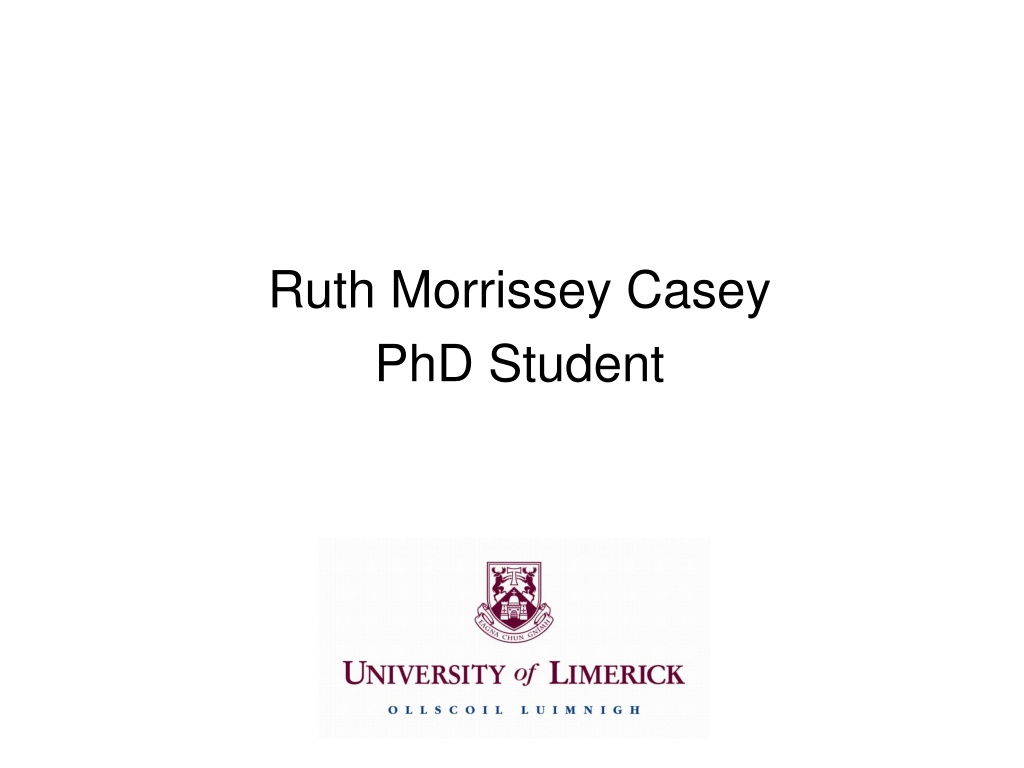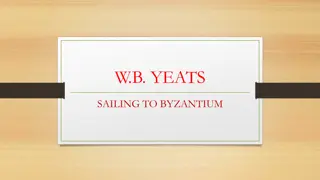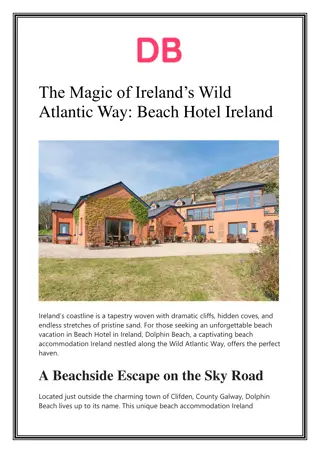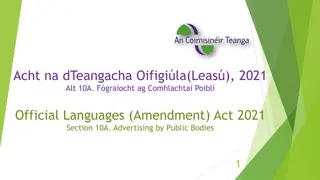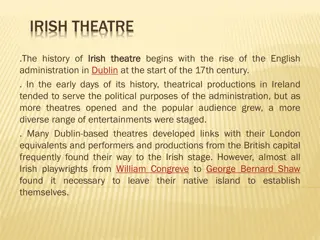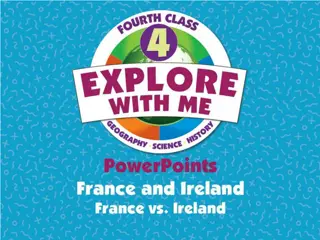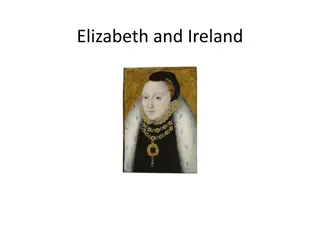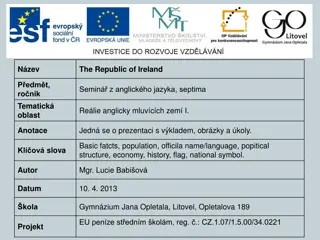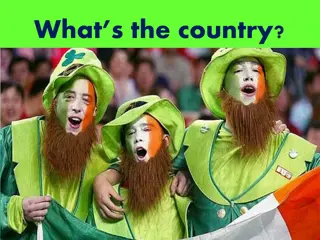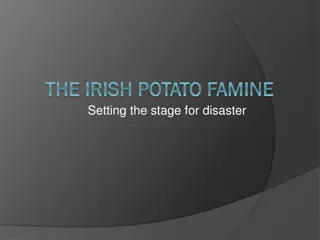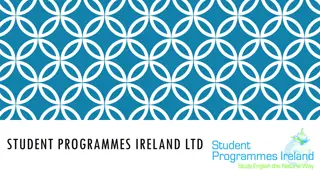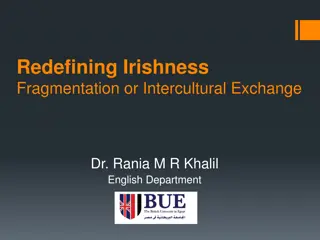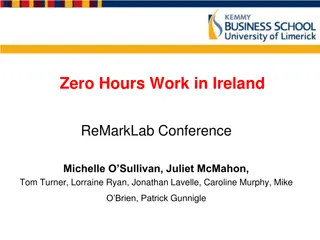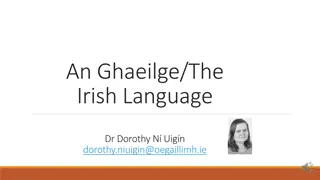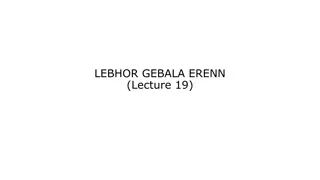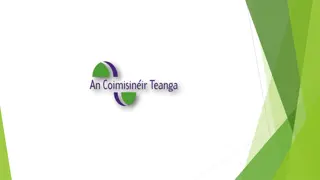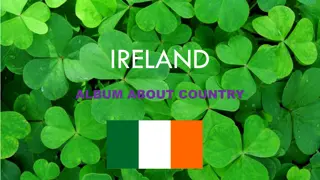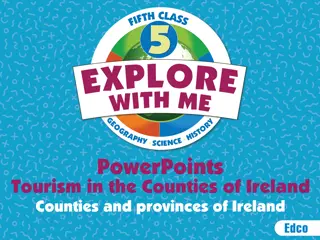Exploring Students' Perspectives on the Irish Language in Present-Day Ireland
Ruth Morrissey Casey, a PhD student, delves into the contrasting realities of the Irish language's official status versus its declining popularity among students. Her research aims to uncover the evolving perceptions of Irish identity and the role of language in shaping national identity in a globalized society. Through a thorough literature review, she examines the intertwined dynamics of language, identity, and educational policies in Ireland.
Download Presentation

Please find below an Image/Link to download the presentation.
The content on the website is provided AS IS for your information and personal use only. It may not be sold, licensed, or shared on other websites without obtaining consent from the author. Download presentation by click this link. If you encounter any issues during the download, it is possible that the publisher has removed the file from their server.
E N D
Presentation Transcript
Ruth Morrissey Casey PhD Student
Title of Research: Looking from the inside out: Exploring Students Perspectives on the Irish Language
Background and Context of My Study The Official Rhetoric Present day Ireland has two official languages Irish and English. According to Article 8 of the Irish Constitution, the Irish language is the first official language of Ireland , and English is the second official language (Bunreacht na hEireann, 1937) and is acknowledged in the Education Act as a compulsory state subject in primary and second level schools. Much of the rhetoric that surrounds the Irish Language is based on historical loyalty and nationalism (O Croidhe in, 2006) The Actual Reality More students take honours French each year than honours Irish (DES, 2011), the number of students seeking exemptions from Irish is increasing annually (DES, 2011). NCCA reports show it is a subject students struggle with and show little enthusiasm for (NCCA, 2005) Due to globalisation and creolisation factors Ireland is changing. In an increasingly globalised society have people s perceptions of Irish have changed? Is language important in creating a national identity?
Literature Review The National Context Constitution official state language The Dept. of Education and Skills Policies, Circulars, Statistics (www.education.ie). NCCA policies and publications on the Irish language (NCCA, 2003, 2005, 2007) Government funded organisations e.g. Gael-Linn, Conradh na Gaeilge All state documents, services provided in Irish. What has the research shown about Language and Identity? Language and identity are interlinked and overlap the productive force of language in constituting identity rather than identity being a pre-given construct that is reflected in language use (Pennycock, 2004:13) Oppositional Identity No coherent identity Language ideology and Power Relations Perspectives of Identity and Social Identity in factors of motivation and attainment Curricula that have been implemented on students in other countries and the impact they have had.
Literature Review What has the research already found? Much of the research carried out with students and attitudes towards Irish has tended to focus quantitatively with attitudinal type questions and Likert style responses. (Hickey, 1990,1992,1996,1999). The Irish language in the educational context of second level schools (Harris, 20007, 2009) (Harris & Murtagh, 1987, 1988, 1999) has tended to focus primarily on Irish as an academic subject, motivation and students attitude and the acquisition of the language. The literature suggests that there is a strong symbolic attachment to the language perhaps in light the every changing global landscape. Research has also been carried out on the historical background of the language, language revival and the cultural aspect of the Irish Language (O Laoire 2005,2006), (O Croidhe in, 2006) The Irish language in the context of Northern Ireland Studies have been done on immersion education or bilingualism focusing on in Gaeltacht schools, Gaelcholaist and Gaelscoileanna
Rationale for my Research Focus The impetus behind my study is influenced by he German sociologist Max Weber (1864-1920) who argued that the purpose of social research should be to understand how people understood or interpreted their own world. As such, he felt, social research should be deeply engaged in and interested in peoples own views and feelings about the world. My study will follow a qualitative interpretivist approach This interpretivist model of research aims to study the particular and views reality as a complicated mix of different contributing factors that should be understood in all its complexity. Interpretive studies assume that people create and associate their own subjective and intersubjective meanings as they interact with the world around them (Orlikowski and Baroudi 1991)
Methodological Analysis Adopting a Social Psychological Discursive Approach Discourse analysis refers to a variety of theoretical approaches concerning the studying and understanding of peoples use of language mediums in social action and interaction. Its roots are largely embedded in linguistic philosophy, ethnomethodology and speech act theory (Potter, 1987) Discourse analysis considers peoples identity and knowledge about the world to be constituted and constructed in discourse. Speech is regarded as an activity analysed as social interaction, all forms of spoken interaction, formal and informal, and written texts of all kinds (Potter & Wetherell, 1987). Discourse analysis is concerned with questions about how discourse is organised and how people construct a coherent social world with the interpretive repertoires they employ.
Analytical Concepts My Theoretical Lens-Discursive psychology (Edwards and Potter, 1992) A concept developed to aid the discourse analysis of talk and texts. They are recognisable routines of connected arguments, explanations and descriptions borne from familiar anecdotes, metaphors, jargon, metaphors or clich s. Interpretive repertoires are the building blocks through which people develop accounts and versions of significant events in social interaction and through which they perform identities and social life Interpretive Repertoires When we use language we position ourselves in certain a way to the knowledge. We can empower or disempower ourselves through the discourse as identities are fluid and interchangeable. Some identities are formed through pre-existing discourses but can change in accordance to the cultural context. Social Positioning Discourse can be problematic insofar as knowledge can be of a contradictory nature. According to Billig (1988), lived ideologies are expressed through beliefs and value systems. Edley,(2001) sees ideologies as the winning arguments people submit and their flexible, rhetorical nature is evident in the accounts given. Ideological Dilemmas
Progress to Date Discussion groups were formed with eight transition year students from six alternative schools in Co. Clare. Students were be chosen by means of random sampling (Morrison, 1993) Transcripts were coded in accordance with the theoretical lens of Wetherall and Potter (1992). Reading of literature has been ongoing Attendance of Conferences I have attended presented and attended numerous conferences including the Mary Immaculate Summer School, the ERSI national conference, the Doctoral Research Conference in Queens University Belfast, Teagasc Tion il, the Clare ad Limerick Education Board Conference 2014 and 2015
Bibliography Billig, M (1991) Ideology, Rhetoric and Opinion London: Sage Bunreacht na hEireann, (1937) Article 8 Edley, N., (2001) Analysing Masculinities: Interpretive Repertoires, Subject positioning and Ideological Dilemmas in Discourse as Data: A guide for analysis by Margaret Wetherall , Stephanie Taylor and Simeon E. Yeats, London: Sage Harris, J. and Murtagh, L. (1999). Teaching and Learning Irish in Primary School: A Review of Research and Development. Baile tha Cliath: Institiuid Teangeola ochta ireann. Hickey, T. (1999c). "Irish in Education in the Republic of Ireland." pp. 85-86. (in) Spolsky, B. (Ed.) Concise Encyclopaedia of Educational Linguistics. Oxford: Pergamon Press. Hall, S (1996) Introduction: Who needs identity? In S Hall and P Du Gay (eds) Questions of Cultural Identity London: Sage Publications O Croidhe in, C., (2006) Language from Below. Dublin: Peter Lang National Council for Curriculum and Assessment (2005) Review of Languages. Dublin: NCCA
Bibliography Orlikowski, W.J. & Baroudi, J.J. Studying Information Technology in Organizations: Research Approaches and Assumptions , Information Systems Research(2) 1991,pp.1-28 Pennycook, A. (2004) Language Policy and the Ecological Turn Language Policy 3: 213-39 Wetherell, M, Stiven, H and Potter, J (1987) Unequal egalitarianism: A preliminary study of discourses concerning gender and employment opportunities. British Journal of Social Psychology, Vol.26, pp.59-71 Wetherell, M., & Potter, J. (1988). Discourse analysis and the identification of interpretive repertoires. In C. Antaki (Ed.), Analysing everyday explanation: A casebook of methods (pp. 168-183). Newbury Park, CA: Sage. Taylor, S. (2001) Locating and Conducting Discourse Analytic Research , in Wetherell, M., Taylor, S., and Yates, S.J. (eds.) Discourse as Data. London: Sage. 20 Year Strategy for Irish, (2009) Dublin: Government Publications
